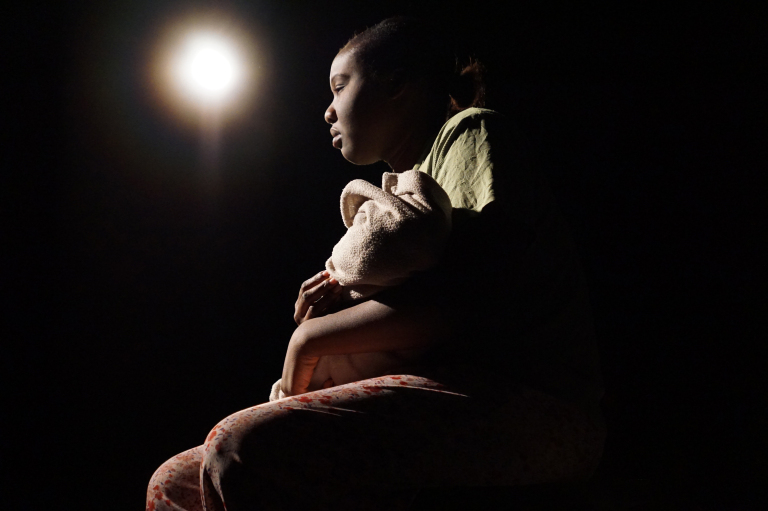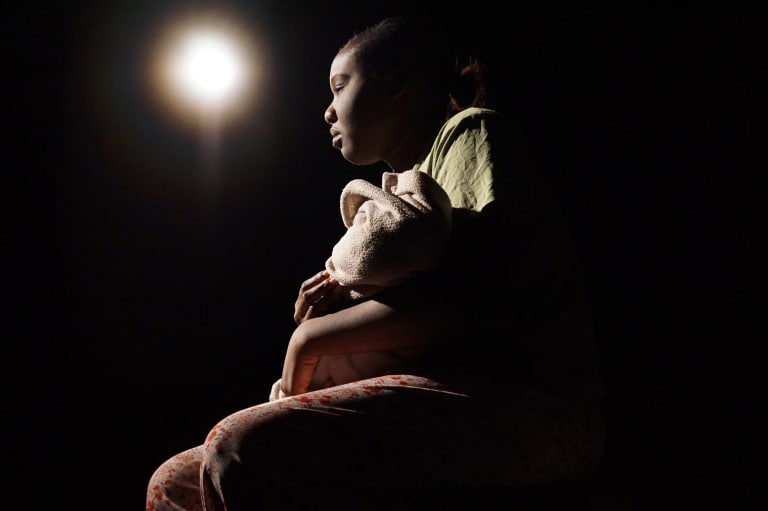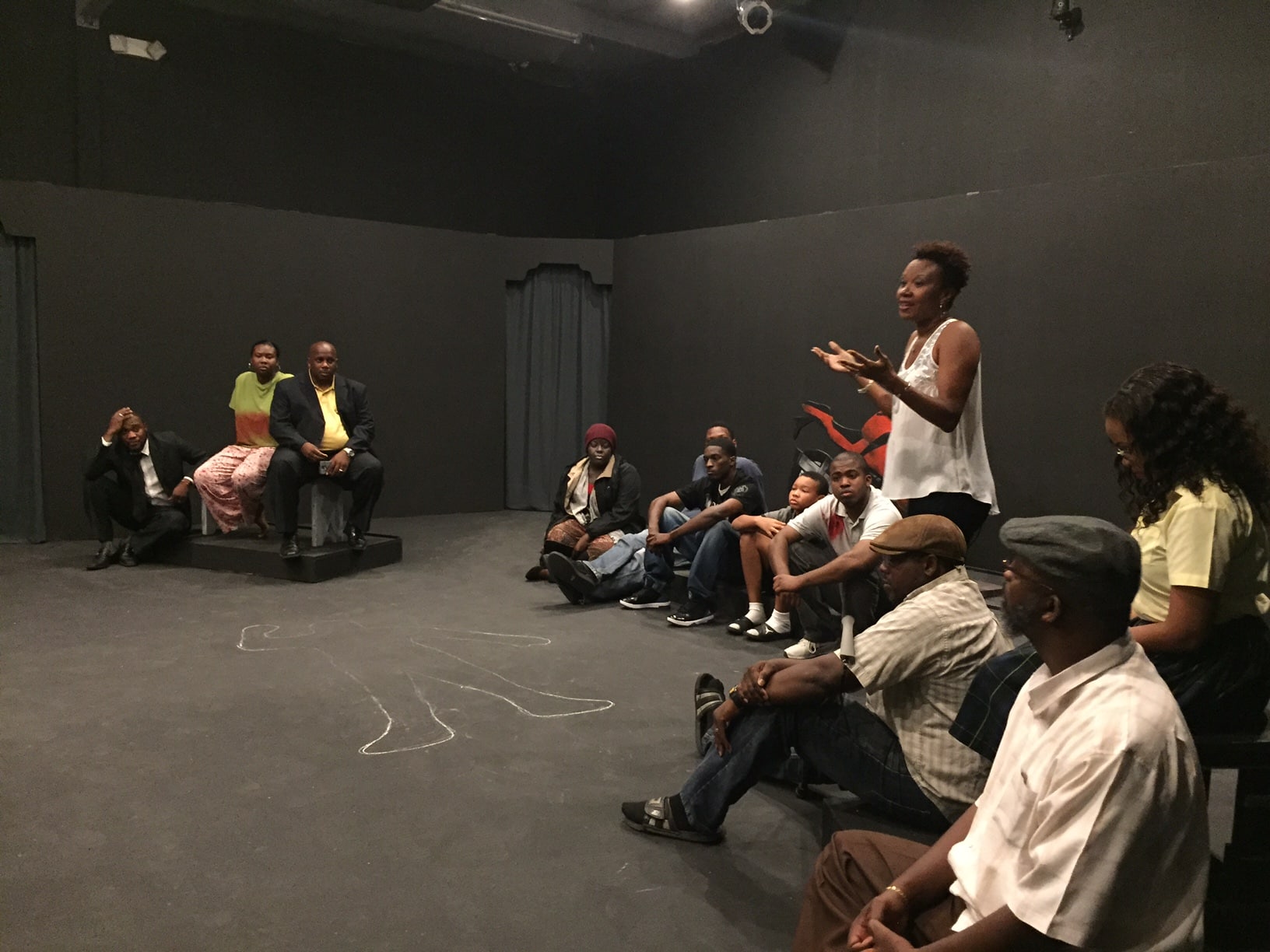
By Dr. Ian Bethell-Bennett
If I could write this in stone, I would score through marble to make it a memory Never fading, never wearing out, never disappearing. Violence holds us in the hollows of its grip Sucks out our marrow And churns us back into a pile of vile puke that no one sees, we just smell the rot.

A melodic setup
‘The Dundas’ Black Box Theatre is an intimate space for players and audience alike, forcing them all into close engagement with one another. Gun Boys Rhapsody begins with what in Shakespeare’s day would have been a loaded soliloquy, foreshadowing the devastation that lay ahead. As the actor tells the audience his life is about to end, we are far from prepared for the heart-tugging roller coaster escapade into which we have ventured.
Gang relations, for many, seems to be one of the few forms of social connectivity we still engage in. Perhaps the play’s politician character serves as a stinging indictment of this status quo we have inherited from our post-emancipation drive for personhood – difficult in the midst of the fields of indentureship and continued racial segregation and oppression. Without the catharsis of time, talk, and community healing programmes, it becomes an even more herculean task.
Violence and social decay have become realities on our 21 by seven island, where lawlessness and greed have consumed a generations people who have little left to believe in. Perhaps the most robust character in the play is the politician, played by Chigozie, whose character is vacuous and corrupted by external pressure and society bearing down. He finds himself trapped within a system built on cronyism, nepotism and enticement of the late capitalist reality of neoliberalism.
Playwright, Ian Strachan captures the inner workings of our small communities as they implode in decay, incest, single-parenthood and explode in rape, gender-based violence and exploitation. Moreover, all because we have come to the point where there is no longer the ability to empathise with our neighbours.
Significantly, the play is a snapshot of life in the ghetto, though it is not really a ghetto. Instead, it is a once well-established neighbourhood, abandoned by the moved-to-the-suburbs do-gooders who have distanced themselves from their roots, turning their backs on poverty, or so they think. They have abandoned the old silk cotton tree on the corner, under which the community once gathered to share the joy and to mourn hardships and loss. These days, they are instead the sight of a drive-by, walk-by, drug-perpetuated, greed-driven shooting ethos that is borne of the lack of involvement in a society that is slowly unraveling.
Thug Life
The quick unraveling comes from the youth, the Gun Boys, who know no surrender because they have nothing to lose. The slow falling apart is seen by the older men, concerned less with their power and more with surviving the new reality that has consumed their once idyllic though poor homes. They are not locked into a world of presumed safety with windows shut tight against the reality of poverty and crime lurking just outside the door and emptiness haunting the bowels of this promised land of suburbia.
The Obeah man may have been eclipsed by the motorbike-riding, hard-living take-no-hostage gangster who knows how to perform only hard masculinity because of the father who never fathered, only beat, and the mother who only abused, because, honestly, abuse was the thing known.
This is a horribly tragic and real life tale of our 21st-century island in the sun where no one is anyone’s keeper. The youth are being wiped out ever younger, but not before falling prey to the power of exceptional violence.

The man who knows no love other than violence. He resents every man whom he sees as ‘threatening’ his thinly-lacquered masculinity – all so that he can shine bright like a diamond until his star falls on his 18th, or if he lives long, luckily or unluckily, 22nd birthday. However, he has shone, he was a man.
Thug life or no life! What is missed is the oxymoron in that statement because thug life is no life. Thug life ends before it begins. Time is always counted, as one rises one is already on the decline.
The play holds nothing back; in fact, it lays bare the psychological and spiritual death such exceptional violence and corruption has in the community. A mother may lose her son in some freakish accident that no one will ever be held responsible for. The church comes around to seek its tithes but only worsens the desperation as the stained glass fortress blocks out the light from folks lives.
When healing becomes (im)possible
Social realism is always disturbing, but it carries great potential for healing. However, we have become inhabitants of an exceptional place where God is love, but the love is not for us. God only loves when we pay to play. Exceptionalism is the excuse for the devastation of young black boys who are angry because they are destroyed by that world that claims to big them up.
Politicians, wayward fathers, and visiting partners beat them, violate them and then move on as they create short-term ‘loving’ relationships with their mothers and bring more lives into an already overtaxed house where the roof leaks, no one works, and the rats roam freely. The scene is set, and the lights rise on the impossibility of escaping the ghetto and the violence resident there and everywhere.
Social realism is the music of Nina Simone and Billie Holiday, like those strange fruit swing from trees. Only now they lie in roads; the rope is now a gun, and the twisted mouths refuse to surrender.
How do we heal? How do we recover when the walk ahead is over the skeletons, corpses, guts of haunted beings whose names escape our memories because history and the present did not see fit to value black lives, poor lives, women’s lives.
We are told to call on God, but we are not taught how to forgive ourselves, our anger and our sins so that we can begin to pick up pieces of lives lost and communities abandoned by the very folks who claim to work for their deliverance from darkness.

The cast did an exceptional job of bringing this painful daily fight to the eyes of the public often cut off from humanism and compassion. It was a painful and heartbreaking journey down Quakoo Street where the next little boy is being born into a life of no surrender, the next girl’s virginity captured by thug dudes who destroy everyone because they are angry. While the masters sit around and puppet them all into taking no prisoners but being men who shoot to kill.
What makes this violence exceptional? What tells us that these cases are exceptions? What is exception? That we can be killed and not missed, or that violence in the ghettos is less important than violence elsewhere?
Can we hope that the art of witnessing, so skillfully deployed in this play, be used to promote healing in school groups and communities where there are few lives who can be rescued from the destruction of loveless non-parenting and paternalist misogynistic gunshots?
Plantations are replaced with resorts now, but nobody is truly free when they can only read well enough to mix a few cocktails and play their role for tourists in this staged paradise. When the curtains close, they must trudge back to their one-light house, where nothing but misery meets them at the door, and their self-regard and self-determination are taken away by a system they are deluded into believing they are overcoming. However, in truth, it is destroying all of us because they are exceptions, not to be confused with the politician’s son.
The requiem is real and the procession painful as it ushers us through the graveyard gates to live in a place of no surrender because the system is stacked against us, and no one cares as long as they can build their barriers higher, and they can lie better.
Strachan hits a real nerve, but the potential healing of the group dynamic and the debriefing or sharing after the play are cathartic, as long as we allow the catharsis to work. The pain was palpable in the theatre, but the communal covenant at the end helped to break down some of the pain-numbing barriers to social healing and development.
Illuminating!
Comments are closed.